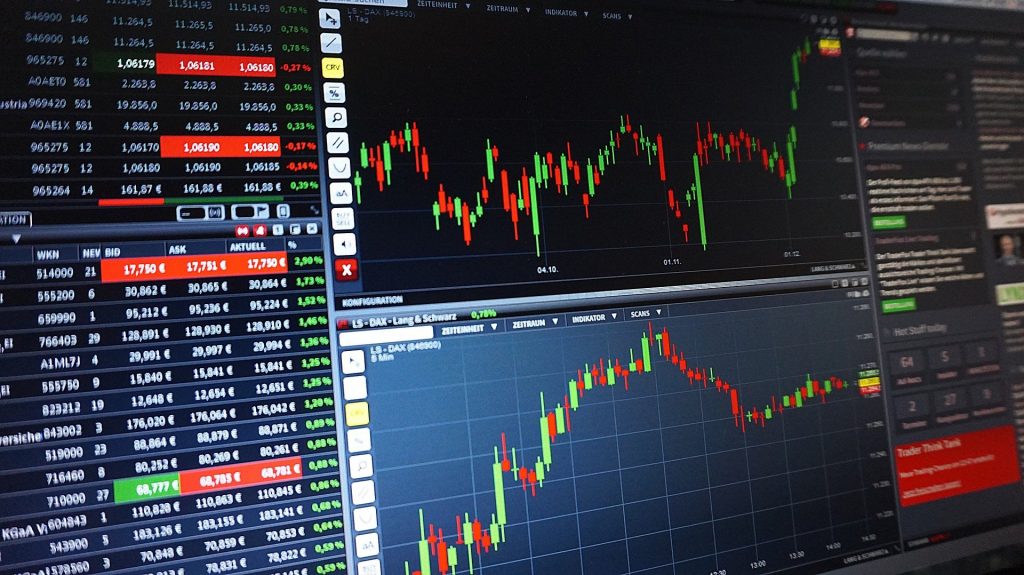Arbitrage Trading



Arbitrage trading is the practice of profiting from price disparities or inefficiencies in financial markets such as forex, crypto, commodities and stocks. It is an ultra short-term trading method with quantifiable risk. This article will review how it works, the pros and cons, strategies, how it can benefit swing traders, and answer some of the most popular questions. We also list the best arbitrage trading brokers.
What is Arbitrage Trading?
To profit from price differences between similar or related financial assets, there needs to be market mispricing. Errors of large amounts won’t persist for long, but tiny inefficiencies can be exploited.
Essentially, when two identical instruments are priced differently, there may be an arbitrage opportunity. This is because investors assume that the price will return to its past patterns.

You can use this trading strategy on many popular assets, including:
- Forex pairs – EUR/USD, USD/JPY, GBP/NZD
- Equity & stock – Amazon, Microsoft, Apple, Visa etc
- DeFi & crypto – Bitcoin (BTC), Litecoin (LTC), Ripple (XRP), Tether (USDT), plus with flash loans
- Commodities – Energy (oil, natural gas, gasoline) and other natural resources like corn, sugar, gold, silver, cocoa and coffee
- Options – This is where the owner has the right, but not the obligation to sell at the specified date and strike price. Contracts can contain a varied class of financial assets
- Futures – These are financial derivatives in which two parties agree to acquire or sell an asset at a fixed price in the future. They can be commodities like gold, Indian stock markets, or other types of investments
How Arbitrage Trading Works
Arbitrage trading opportunities are available on different platforms such as eToro, Binance, Kraken, Uniswap, Pancakeswap, Interactive Brokers, MCM Markets, IG, Robinhood, etc. The long and the short of it is that you can find opportunities anywhere, meaning all you need to consider is the type of asset which you want to arbitrage and then use your favorite broker or exchange.
Methods
- Pure arbitrage – The simplest method, where an investor buys and sells an asset in multiple marketplaces to profit from a price difference. Unfortunately, taking advantage of these situations is harder because technology has improved. So, genuine arbitrage has become uncommon.
- Merger arbitrage (M&A) – A merger typically involves two parties: acquiring corporation and target. If the target is publicly listed, the acquiring company must buy all outstanding shares. Announcing the agreement causes traders to buy in. However, if the investor feels a transaction will fail, they may seek to short the target company’s stock.
- Convertible arbitrage – This involves bonds, notes or debt. A convertible bond is a kind of business debt that pays interest to the holder. They may be exchanged for shares of the underlying company, usually at a lower cost. This type of arbitrage strategy seeks to generate returns from the difference between the bond’s conversion price and the current share price. Investors can take positions long or short in both bonds and stocks. The buy and sell ratio relies on the bond’s price. If traders believe it’s inexpensive, they will short the stock and buy more bonds. This process happens in reverse when investors believe the bond is expensive.
Examples
Arbitrage trading definitions can be broken down into several practical examples:
- Crypto – BTC is trading for $40,000 on Pancakeswap and $40,500 on Uniswap. A trader spots this difference, buys BTC from Pancakeswap, and immediately sells it on Uniswap. The price difference is their profit.
- Stocks – A stock sells for $55 on the New York Stock Exchange (NYSE) and $50 on the London Stock Exchange (LSE). An investor can, therefore, buy the asset from the NYSE and sell it on the LSE. Again, the price difference is their profit.
Forex
In this arbitrage trading model, we run through a complex forex case. You have $10,000 and see the following currency rates on three different platforms:
Broker 1: EUR/USD = 0.765
Broker 2: EUR/GBP = 1.165
Broker 3: USD/GBP = 1.732
- Firstly, you exchange your money for EUR at a 0.765 rate. Now you have 7,650 euros
- Secondly, you convert the EUR to GBP at a 1.165 rate. This gives you 6,566 pounds
- Finally, you swap the GBP to USD at a 1.732 rate. You now have 11,372 dollars, and a profit of $1,372.
Notice how you move from broker to broker to make the exchanges.
Arbitrage Trading Software
You can use arbitrage software to help you trade assets like forex, cryptocurrency and stocks, among others. Systems essentially use formulas and algorithms to alert you to the best opportunities and can even be incorporated with trading robots for an automated process (auto trading). They are usually available worldwide in different countries like India, the UK, the US, South Africa, Nigeria, Germany, and many more.
The key systems to understand are:
- Automated trading software – If the trading chances are rare and only last a few seconds, investors do not usually have enough time to make their calculations. In this case, they utilize software to locate and calculate arbitrage possibilities. When the bot discovers an opportunity, it instantly makes the transaction. This tool tackles one of the main obstacles in arbitrage trading: quick and precise transaction executions. A few companies which offer bots are Pionex, Arbitrage EA, Grinta and WazirX. Note, arbitrage trading bets are often based on data alone.
- Trade alert programs – If investors don’t want a bot to make the transactions on their behalf, they use alert software. These programs continuously search markets, instruments, and firms for arbitrage trading opportunities. When they find one, they alert the trader who can then choose how to proceed.
- Remote alert tools – Rather than using their computer to run the software, some prefer a subscription service. This allows investors to get alerts for arbitrage trading possibilities, similarly to running their own application. There are both free and paid-for solutions available.
Pros of Arbitrage Trading
- Simple – It is a relatively straightforward investment concept
- Rebalances the market – Arbitrage trading helps the markets to stabilize and ensures uniform pricing across the board
- Trading desks – Many investors have gathered in hubs on forum pages like Reddit, Quora and Telegram groups. Here you can ask experienced traders your questions and learn from their posts
- Popular – Because of its appeal with swing traders, many resources are available, such as books, Wiki articles, Zerodha pages, Moneycontrol news, strategies on YouTube, arbitrage indicators on Tradingview, systems for MetaTrader 4, plus courses and training programs
Cons of Arbitrage Trading
- Fees – You should always consider account and execution fees, which will cut into your profits. If they are too high, you may make a loss.
- Rate fluctuations – The price may change so quickly that you miss the discrepancy. Even when you are on time, you might have missed the opportunity because bots can execute transactions before you.
- Fairness – Institutional investors have an advantage over retail traders because of access to faster news sources, better computers, and sophisticated software. They often seize the best opportunities before retail swing traders.
- Risks – Even though it may give a trading advantage, incorrect assumptions can cause losses. The idea behind arbitrage pricing is that investors can identify all factors affecting an asset’s worth. This information may alert a trader to a potential opportunity, but it isn’t always accurate.

Strategies Explained
Arbitrage quant trading can include using python bots found on GitHub or crypto bots on Reddit. The programs use complex formulas and algorithms to find the best opportunities. However, this is an advanced strategy.
Below we will break down the principles in a few easy techniques so you can get started arbitrage trading today.
Covered Interest
The forwards market accounts for currency exchange rate disparities. A trader might benefit at expiry if the market doesn’t appropriately incorporate the change in interest rates.
For example, let’s say the 90-day interest rate for the euro is greater than the ratio for the US dollar. Investors can borrow dollars to convert them to euros and deposit the money at a higher price. Simultaneously, they would enter a 90-day forward contract. The deposit is exchanged back into dollars at a fixed rate when it matures. Traders profit when they settle the forward contract and return the loan in dollars.
Locational Arbitrage
This is an arbitrage trading strategy where the investor might profit from discrepancies between the exchange rates of a forex pair offered by multiple banks.
Assume that the yen to British pound exchange rate at Bank A is £0.0066; this means a yen costs £0.0066. Bank B offers £0.0055. Investors may take pounds and exchange them for £0.0066 yen at Bank A, then sell to Bank B for £0.0055. The difference of £0.0011 is the profit.
Triangular Arbitrage
This approach uses three assets and websites. Investors could, for example, convert Bitcoin for Litecoin, then Litecoin for Ripple, and finally Ripple back into Bitcoin. You have 10 BTC in capital and the following rates are available at different exchanges:
Exchange 1: BTC/LTC = 382.68
Exchange 2: LTC/XRP = 140.742
Exchange 3: XRP/BTC = 0.000028
- Change your BTC to LTC at a 382.68 rate. Now you have 3,826.8 LTC
- Convert the LTC to XRP at a 140.742 rate. This gives you 538,591 XRP
- Finally, swap the XRP to BTC at a 0.000028 rate. You now have 15.08 BTC, and a profit of 5.08 BTC
Volatility Arbitrage
This is an advanced strategy. A statistical arbitrage method capitalizes on the difference between projected future price volatility and the implied volatility of options on an underlying asset, such as a stock.
For example, a trader thinks a stock option is undervalued due to low implied volatility. As a result, they place a long call option and a short position on the stock. If the price doesn’t change and the trader’s implied volatility prediction is true, the option’s cost rises.
Final Thoughts
Arbitrage trading strategies offer investors a fleeting chance to make a profit. Its biggest advantage is the ease of use and flexibility across most financial instruments like forex, stock, bonds and cryptocurrency. Furthermore, you can find plenty of arbitrage lucky chances on international markets such as the National Stock Exchange of India (NSE), Bombay Stock Exchange (BSE), New York Stock Exchange (NYSE), and London Stock Exchange (LSE). See our list of supporting brokers to start arbitrage trading today.
FAQ
Is Arbitrage Trading Risk-Free?
Although the risk is limited, it’s not absent. As with any investment, your capital is at risk. Also, traders should take into account execution fees that cut into profits.
Is Arbitrage Crypto Trading Legal?
Several countries where arbitrage trading is legal include the US, UK, South Africa and India. Check your region’s legislation before trading crypto, as this can vary. Also consult a religious leader for guidance on whether arbitrage trading is halal or haram.
Is Arbitrage Trading Profitable?
Arbitrage trading does work, but it depends on the price discrepancies and your order size. A larger investment will result in higher earnings. However, this also increases the risk.
Is Retail Arbitrage The Same As Trading Arbitrage?
No – even though they follow a similar principle, retail arbitrage involves the purchase and sale of goods such as cars, boats and toys on platforms like Amazon and eBay. This type of arbitrage is specific to merchants. Trading arbitrage refers to the investment strategy used on financial instruments.
Is Arbitrage Trading Possible Between Exchange Platforms?
Yes – this is called cross-exchange arbitrage. A trader makes money by purchasing crypto on one exchange and selling it on another. If the price discrepancy works in their favor, the investor makes a profit.
What Is The Difference Between A Hedge And Arbitrage Trading?
When hedging, you place several simultaneous bets in opposing directions to reduce the chance of financial loss. Arbitrage involves trading a price discrepancy across markets on the same asset to benefit from the mismatch.
